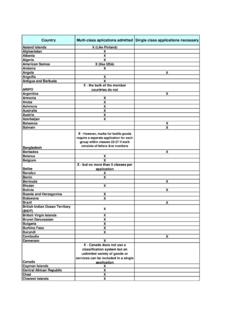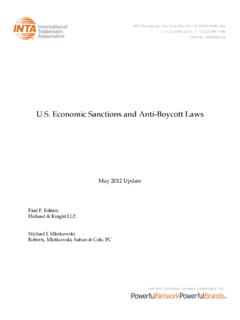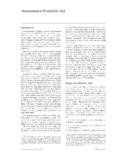Transcription of Opposition and Cancellation Standards and …
1 1 Opposition and Cancellation Standards and Procedures Subcommittee INTA Enforcement Committee Report and Recommendations: Partial Cancellation Actions Based on Non-Use June 2011 2 I. Introduction The Opposition and Cancellation Standards and Procedures Subcommittee was charged with analyzing non-use Cancellation actions in selected jurisdictions where the mark is used on some but not all of the goods and services covered in the registration and determining whether harmonization or standardization is possible or should be encouraged. This report summarizes and analyzes the Subcommittee s findings on this issue and sets forth its conclusion that INTA should encourage and promote the availability of mechanisms for third parties to remove goods and services from the scope of existing trademark registrations when the registration owner has not used the mark with those goods or services. For the purposes of this report, partial non-use Cancellation means removing certain goods or services from the scope of protection of a trademark registration where a third-party establishes that the owner of the registration has not used the mark with those goods or services, while maintaining protection for those goods and services with which the trademark has been used.
2 In other words, partial non-use Cancellation means a reduction or limitation of the list of products or services comprised in the registration, eliminating those in respect to which the mark has not been used. In performing the task, this subcommittee took into consideration the reports of previous INTA committees and subcommittees, as follows: Use-based Trademark Rights Task Force ( 2003 Report ), which conducted a survey in which INTA members were asked to identify the advantages and disadvantages of three types of systems with varied use requirements; Use-Related Requirements For Issuance And Maintenance Of Trade Mark Registrations ( 2005 Report ), which analyzed advantages and disadvantages of use-based trade mark registration systems in light of INTA s goal to promote harmonization of trade mark law and practice; Part Cancellation Report of Europe & Central Asia Subcommittee of the Legislation and Regulation Committee ( 2009 Report ), which compared the various approaches of the competent trademark offices or courts with respect to the requirement to provide evidence for genuine use in trademark proceedings.
3 The Subcommittee also considered existing INTA policy statements regarding use requirements as described, in particular, in INTA's Model Law Guidelines (last revised Nov. 2007) (see the discussion in Section III of this report). These documents are available from the INTA web site and are attached as Appendix A to this report. The Subcommittee members who contributed to this report include Orlando Cardoza, Todd Deveau, Peter Eriksson, Tanya Indra Escamilla Lujan, Wiebke Gorny, Pavel Gorokhov, Katherine Keating, Hung Nguyen, Anita Polott, Dafne Ramos Samanez, Pamela Rask, Christopher Schneider, Ana Vargas, Romain Viret and Michael Zuck. II. Initial Research As a starting point, the Subcommittee surveyed attorneys from 71 countries1 to determine specific differences among non-use Cancellation proceedings, harmonization or standardization of which may be desirable. We asked representatives from each country/region to provide us with some general comments about non-use Cancellation procedures in their countries.
4 To enable us to more fully understand and compare non-use Cancellation proceedings we also researched the INTA on- 1 For the purposes of this survey, Belgium, The Netherlands and Luxembourg are considered as three separate countries. 3 line Country Guides and Opposition Guide. Our main findings are summarized below and are set forth in detail in the chart attached as Appendix B to this report: Are non-use Cancellation actions available in your country? Almost all the surveyed jurisdictions allow non-use Cancellation actions. The only jurisdictions identified as not allowing non-use cancellations are Chile, Monaco and Uruguay. What are the legal requirements? Most of the countries (45) allow challenging trademark registration on non-use grounds where the trademark has not been used for five successive years. These countries are: Argentina, Austria, Bahrain, Belarus, Belgium, Bosnia and Herzegovina, Costa Rica, Croatia, Cyprus, the Czech Republic, Denmark, Egypt, El Salvador, Estonia, the European Union, Finland, France, Germany, Greece, Hungary, Ireland, Italy, Kenya, Latvia, Lithuania, Luxembourg, Malta, Montenegro, Morocco, the Netherlands, Poland, Portugal, Moldova, Romania, Senegal, Serbia, Slovakia, Slovenia, South Africa, Spain, Sri Lanka, Switzerland, Turkey, the United Kingdom and Uzbekistan.
5 As is evident, a five-year non-use grace period exists in practically all European countries. Some jurisdictions (22) provide for a shorter non-use grace period - of three successive years. Those countries are: Canada, China, Colombia, Cuba, the Dominican Republic, Ecuador, Honduras, Indonesia, Israel, Japan, Kazakhstan, Kyrgyzstan, Mexico, Nicaragua, Oman, Peru, Korea, Russia, Taiwan, Trinidad & Tobago, Ukraine and the What is the Authority in charge of the procedure? In 27 countries non-use Cancellation actions are reviewed by the courts. In 32 countries they are reviewed by the Registrar, national PTO, or similar administrative authorities. Nine countries provide for both legal and administrative procedures. What evidence is required from a claimant? In 30 countries it is required that a claimant prove lack of use of a trademark. This number includes those countries where it has become customary in practice to file such evidence even though the claimant is not formally required to supply it.
6 In 19 countries the claimant is required to prove a legitimate interest in the Cancellation of a trademark. This number includes those countries whose survey respondents did not specifically mention such requirement, but where the law requires the claimant to be an interested person. Hence, we assume that the claimant in these countries is likely to be required to prove its legal interest. The interest may be an activity linked to the products or services covered by the trademark (like in France), or the claimant may suffer from the respective registration ( , the Trademark Office cites the other mark as an obstacle against the claimant s application), as in Finland. We did not analyze this issue in detail since it appears to be beyond the primary objective. However, our research shows that in 25 of the researched countries, the claimant is not required to file any kind of evidence, as the burden of proof is placed on the owner of the registration.
7 We came to the conclusion that the results show different approaches in different countries with regard to evidence from the claimant. The matter may call for more detailed analysis of whether harmonization or standardization is possible as to evidentiary burdens, and, if so, whether it should be encouraged. 2 In the United States, this non-use grace period is part of the intent-to-use trademark application process, through which an application can be maintained for up to three years following Patent and Trademark Office ( PTO ) approval. 4 What evidence is required from the defendant? The scope of required evidence differs from country to country. But common to all the jurisdictions is that defendants are required to prove use of a trademark or to demonstrate valid reasons for not using a trademark. Are partial cancellations available in your country? The vast majority 60 of the researched countries allow partial cancellations of a trademark.
8 At the same time, we identified six countries where partial cancellations are not allowed. These countries are: - Argentina ( The Cancellation will not take place if the registered trademark has been used to cover goods in a different class than the one for which it was originally registered or if the trademark is partially the name of an activity ). - Bahrain ( Bahrain law mentions nothing about the partial Cancellation based on non-use). - Egypt. - Kenya ( There is no provision under Kenya Law for partial cancellations ). - Mexico. - Sri Lanka. In these countries, the trademark registration is either cancelled due to non-use completely, or is upheld completely. As it follows from the search results, generally the owner is obliged to demonstrate use for some of the products listed in the registration certificate, and the registration is upheld in its totality if the owner uses the trademark for at least some of the goods for which it was registered.
9 In Argentina, use of a trademark even in the classes other than those in which the respective trademark had been registered is sufficient to maintain the trademark registration. This provision appears from the Argentine Trademark Law which dates back to 1981. Our survey respondents were unanimous that a reform on partial Cancellation actions in Argentina is desirable. Mexico is not a "multi-class" registration country. Each application/registration covers a single class and exists independently from the owner s companion applications/registrations for the same mark in other classes. Use of the mark for any of the goods or services listed in a particular class is sufficient to defeat a non-use Cancellation action, even if the registration owner has not used the mark with any of the other goods or services listed in that class. Further, the Mexican Law of Industrial Property establishes that if a trademark is registered to protect determined goods or services (with different registrations), the renewal and use of the mark of one registration (in one Class) will benefit the use of the other registrations of the same mark (in other Classes).
10 In Sri Lanka, Cancellation proceedings can be brought in respect of part of the goods/services claimed under a mark, based on absolute grounds and relative grounds. The law does not stipulate similar possibility for non-use Cancellation proceeding. It is interesting to note that in some countries (like Bahrain and Kenya), partial non-use cancellations are not practiced not for the reason of being contrary to local law, but simply because the local law mentions nothing about them. 5 Initially, we have included Bosnia and Herzegovina in the above list of countries, for the reason that the present Industrial Property Law of Bosnia and Herzegovina does not refer to a possibility for the partial non-use Cancellation action. However, further research indicated that the Trademark Regulations of Bosnia and Herzegovina anticipated the possibility of partial non-use Cancellation , and, in fact, partial non-use Cancellation actions are now possible.











